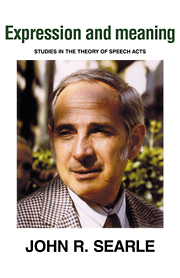7 - Speech acts and recent linguistics
Published online by Cambridge University Press: 05 June 2012
Summary
Until fairly recently it seemed possible to draw a boundary, however vague, between linguistics and the philosophy of language: linguistics dealt with the empirical facts of natural human languages; the philosophy of language dealt with the conceptual truths that underlie any possible language or system of communication. Within the terms of this distinction, the study of speech acts seemed to lie clearly on the side of the philosophy of language, and until the past few years most of the research on speech acts was done by philosophers and not by linguists. Lately, however, all this has changed. In the current period of expansion, linguists have simply moved into large territories where previously only philosophers worked, and the writings of such philosophers as Austin, Grice, and others have now been assimilated into the working tools of the contemporary linguist. The philosopher of language can only welcome this development, for the linguist brings to bear a knowledge of the facts of natural human languages, together with techniques of syntactical analysis which, at least in the past, have been absent from the purely philosophical writings on language. The collaboration between linguists and philosophers is especially fruitful in studying what to me is one of the most interesting questions in the study of language: how do structure and function interact? This question involves such questions as, for example, what is the relation between the various kinds of illocutionary acts and the syntactical forms in which they are realized in the various natural human languages?
- Type
- Chapter
- Information
- Expression and MeaningStudies in the Theory of Speech Acts, pp. 162 - 180Publisher: Cambridge University PressPrint publication year: 1979
- 4
- Cited by



